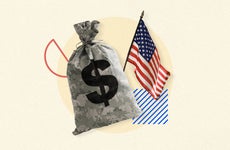
The Bankrate promise
At Bankrate we strive to help you make smarter financial decisions. While we adhere to strict , this post may contain references to products from our partners. Here's an explanation for .
After serving our country, perhaps having fought in battle, many members of the U.S. military find themselves facing a new enemy: debt.
Military veterans often deal with debt from a range of sources, including auto loans, personal loans, student loans, medical expenses and credit cards. Younger veterans, in particular, are prone to racking up late payments on debts or negative marks on their credit reports, according to a report by the Consumer Financial Protection Bureau (CFPB).
Fortunately, a number of resources are available to veterans who are trying to combat debt.
Veterans and debt
For some of the roughly 18 million military veterans in the U.S., making ends meet can be a burden. According to survey data from the Pew Research Center, 35 percent of veterans had trouble paying bills in the first few years after ending their military service.
Post-service issues that veterans struggle with can aggravate these debt problems:
- Despite generous education benefits offered through the GI Bill, 58 percent of veterans who had taken out student loans reported in a Pew survey (taken in 2020 and 2021) that they did so mostly to cover living expenses.
- Some veteran families experiencing food insecurity turn to loans or credit cards to help put food on the table. That’s partly because nearly 40 percent (38.4 percent) of veteran families reported having less than $500 in an emergency savings fund or no fund at all, according to a 2021 survey by the Military Family Advisory Network. More than three quarters of respondents (75.8 percent) indicated that they carry current debt.
- Veterans with post-traumatic stress disorder (PTSD), traumatic brain injury (TBI) or clinical depression were more likely to be saddled with debt than other veterans, according to data published in the 2018 book “Homelessness Among U.S. Veterans: Critical Perspectives.” All told, millions of veterans grapple with PTSD, TBI or clinical depression.
Relatively low credit scores also can dog military veterans.
A military service study released in 2020 by the Consumer Finance Protection Bureau found that among veterans who had spent at least three years in the military, credit scores were fairly steady before leaving, dropping by an average of just 5 percentage points in the two quarters before their exit.
“However, by four quarters after separation,” the study adds, “credit scores had dropped by 21 points.”
Credit scores at time of exit from active-duty military service
| Time spent in active-duty service | Average credit score at time of exit |
|---|---|
| 0 to 6 months | 627 (considered fair on the FICO scoring scale) |
| 7 to 35 months | 607 (considered fair on the FICO scoring scale) |
| 36 months or more | 654 (considered fair on the FICO scoring scale) |
Source: 2020 Consumer Financial Protection Bureau study
Preparing financially as a veteran
If you’ve recently left the military, you can take several steps to get your finances in the kind of shape that would impress a five-star general.
- Set up a budget. Not only should you lay out a spending plan, but you should strive to stick to it. A household budget will help you navigate post-service changes in your financial situation.
- Slash high-interest debt. High-interest debt can eat away at your wallet. Reducing this debt puts more money in your pocket for necessities like housing and groceries.
- Explore health insurance. Once you’re out of the military, you may no longer enjoy access to government-sponsored health insurance, but you can take advantage of insurance deals for veterans and benefits from the U.S. Department of Veterans Affairs (VA). Those benefits likely won’t extend to your family, however, and you might need to look into private health insurance.
- Create an emergency fund. Building your emergency savings prevents minor financial challenges from spiraling into high-interest credit card debt. Start as small as you need to — every little bit helps.
Aside from medical benefits, the VA provides resources to help veterans adjust to post-military financial life. Other organizations that lend a financial helping hand to new or even longtime veterans include the American Legion, Disabled American Veterans, the Consumer Financial Protection Bureau, the VFW, VeteransPlus, the National Financial Educators Council and the Veterans Financial Coalition.
How to handle debt as a veteran
If you need help with debt as a veteran, several initiatives can help you improve your finances:
- Free services are provided to veterans by nonprofit credit counseling agencies. One of these is the Military Reconnect program offered by Money Management International.
- The federal government is ramping up student loan forgiveness for veterans, to the tune of hundreds of millions of dollars.
- The VA has substantially loosened its rules for reporting medical debt to credit bureaus, which should help lighten the substantial load. Veterans had piled up nearly $1 billion in medical debt as of 2020.
- The National Foundation for Credit Counseling’s foreclosure prevention program can help you keep your home if you’ve run into trouble making your mortgage payments.
- If you have a VA-backed mortgage, you might qualify for refinancing that can reduce your interest rate.
- A balance transfer credit card can help you to pay down credit card debt over time, interest-free.
The bottom line
For a military veteran, confronting debt can be tougher than basic training. Yet despite the daunting prospect of juggling mortgages, student loans, credit card bills and other debts, veterans can maneuver this financial minefield by practicing smart money management — and taking advantage of programs set up to help those who’ve served their country take command of their debt.
Related Articles



